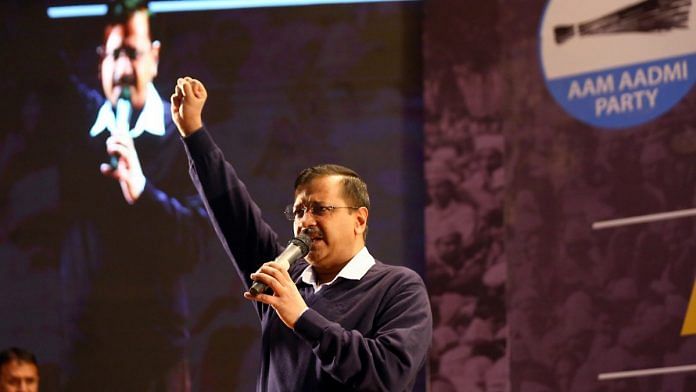New Delhi: The Arvind Kejriwal-led Aam Aadmi Party (AAP) has won a third term in Delhi. The party secured a resounding victory in the assembly election, results of which were declared Tuesday, leading in 57 of the 70 seats, according to the Election Commission website at 1.20 pm.
Delhi Chief Minister Arvind Kejriwal was winning from his New Delhi constituency by 13,508 votes.
According to CNN-News18, AAP candidates Amanatullah Khan and Abdul Rehman, who contested from Okhla and Seelampur, respectively, have been declared winners.
Okhla, where Shaheen Bagh and Jamia Nagar are located, was considered a crucial seat because of the ongoing anti-CAA protests.
Putting up a spirtted fight, the BJP is ahead on 13 seats — up from only three seats in 2015. The last election the BJP had won in the national capital was in 1993.
Tuesday’s verdict shows the people of Delhi have voted for the governance model of education and health over a “hate-mongering” narrative.
ThePrint looks at five reasons why AAP has managed to retain power in Delhi.
From party of agitators to party of governance
The Aam Aadmi Party worked hard towards an image makeover. For a party that emerged out of a nationwide anti-corruption movement, AAP shifted its campaign to focus on its strengths, particularly in the field of education, health, power and water. The party also introduced free bus rides for women soon after their disastrous loss in the 2019 Lok Sabha elections.
Delhi election LIVE: AAP’s Atishi pulls ahead in Kalkaji, but Sisodia still trails in Patparganj
Freebies
The AAP government sought to fulfil pending pre-poll promises in 2019 and made a string of announcements, such as free bus rides for women, no electricity charges for up to 200 units, free Wi-Fi, free pilgrimage for senior citizens and waiver of development charges for new water and sewer connections. The Arvind Kejriwal dispensation also took several steps towards women’s safety, which included installation of 3 lakh CCTV cameras and 2 lakh streetlights across the city, deployment of 13,000 bus marshals and administration of pledge to boy students of all schools to behave well with girls. The party also promised free bus rides for students in its poll manifesto.
Positive campaign
Kejriwal tried to pitch himself as the national alternative through positive campaigning. Instead of attacking Prime Minister Narendra Modi, Kejriwal focused on his own government’s achievements. The BJP kept baiting him but the AAP assiduously avoided getting dragged into the divisive debate on anti-CAA protests at Shaheen Bagh.
Personality cult
The AAP chief continued to project himself before voters as an evolved self — that of an effective administrator as opposed to the aggressive activist — resorting to a time-tested political tactic and one recommended by election strategist Prashant Kishore. He was seen everywhere, from townhall events to public meetings to road shows and multiple mobile apps, to communicate with his voters. From replicating an app like NAMO to entering drawing rooms, launch of WelcomeKejriwal.in to ensure direct dialogue between Kejirwal and the voters he couldn’t meet personally, everything the party did showed it had a clear strategy in place.
Rival BJP had no CM face, relied on polarising narrative
While AAP had a clear CM candidate in Arvind Kejriwal, the BJP never announced one, keeping the voter confused. It’s evident now that Kejirwal’s candidature from New Delhi constituency and projection as the CM candidate went in AAP’s favour as voters usually like to associate a party with a face. More importantly, from biryani to Pakistan, BJP’s hate-driven narrative calling Kejriwal a “terrorist” perhaps also worked against the party giving the AAP an edge. The BJP’s attempt to politicise Shaheen Bagh, the epicentre of anti-CAA protests over the past two months, also seems to have worked in AAP’s favour. While the AAP continued to skirt the issue and Kejirwal didn’t visit the agitation site even once, the women protesters ThePrint spoke to on multiple occasions maintained that they stood by those who favoured “real development” of the country.
Also read: Muslims voting for AAP shows they are desperate and Congress is too passive, apologetic



